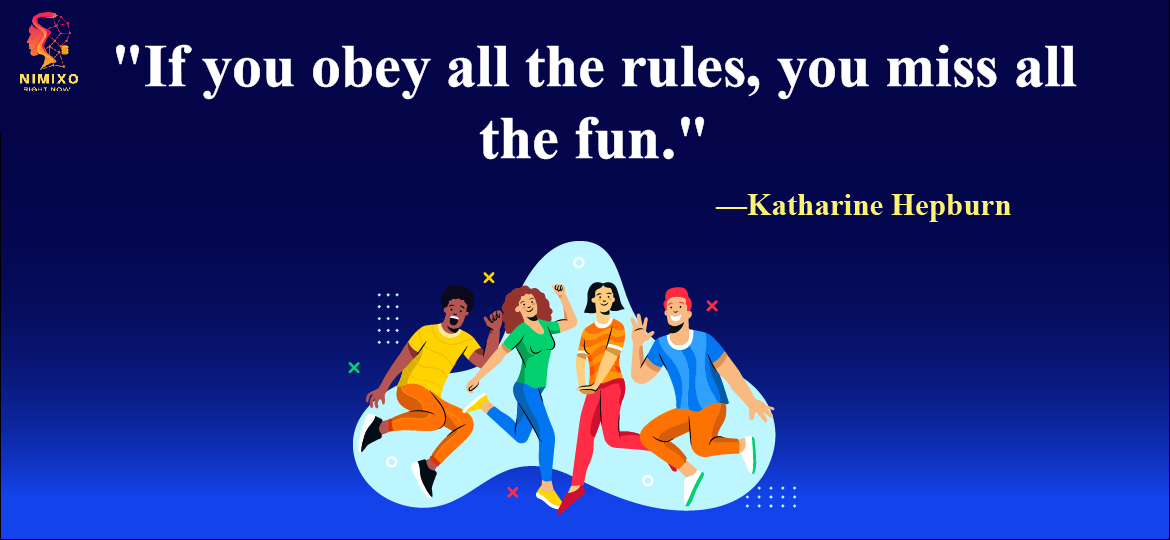Embrace the Rebel Within
In a world governed by countless rules, regulations, and societal expectations, it’s easy to fall into the trap of conformity. We’re often told to play it safe, follow the prescribed path, and never deviate from the norm. But what if I told you that there’s a hidden secret to a more fulfilling life? It’s a mantra wisely said by Katharine Hepburn that’s been passed down through generations and embraced by the daring and adventurous souls among us: “If you obey all the rules, you miss all the fun.”
In this article, we will thoroughly examine the profound insights encapsulated within this time-honored saying and investigate how it strikes a chord with individuals from diverse backgrounds. Regardless of whether you tend to embrace risks, adhere strictly to rules, or find yourself somewhere in between, you’ll uncover the reasons why liberating yourself from the constraints of conformity can pave the way for a life brimming with exhilaration, personal development, and authentic happiness.
The Allure of Breaking the Rules
Human history is replete with examples of rule-breakers who defied societal norms and paved the way for innovation, progress, and change. Consider figures like Martin Luther King Jr., who challenged racial segregation, or Rosa Parks, who refused to give up her bus seat to a white passenger. These individuals didn’t conform to the status quo; they courageously defied the rules of their time to make a lasting impact.
But rule-breaking isn’t limited to world-changing figures. In our everyday lives, we encounter moments when bending or breaking the rules can lead to memorable experiences and personal growth. Whether it’s trying a new hobby, traveling to an unknown destination, or simply speaking your mind, embracing the rebel within can open up a world of possibilities.
The Fear of Conformity
One reason people hesitate to break the rules is the fear of consequences. Society often imposes penalties for disobedience, and the fear of judgment and rejection can be paralyzing. However, it’s essential to recognize that not all rules are created equal, and blindly following them can hinder personal development and self-expression.
The crucial point is to distinguish between rules that safeguard and enhance the greater good and those that suppress individuality or sustain injustice. Embracing a sense of adventure doesn’t entail indulging in heedless actions or disregarding ethical principles. Instead, it involves summoning the bravery to scrutinize and confront rules that hinder your journey toward becoming the most authentic version of yourself.
The Benefits of Breaking the Rules
- Personal Growth: Stepping out of your comfort zone and breaking the rules can lead to tremendous personal growth. It forces you to confront your fears, adapt to new situations, and develop resilience.
- Creativity and Innovation: Innovation often emerges from unconventional thinking and rule-breaking. Many of the world’s most groundbreaking inventions and ideas came from those who dared to question the status quo.
- Authenticity: Breaking the rules allows you to express your authentic self, free from societal expectations. It’s a path to self-discovery and living a life that aligns with your true values and desires.
- Memorable Experiences: Some of life’s most memorable moments come from taking risks and defying conventions. These experiences can enrich your life and provide a sense of fulfillment.
In a world that often emphasizes conformity, it’s easy to forget the liberating power of embracing the rebel within. “If you obey all the rules, you miss all the fun” is a reminder that life’s greatest adventures, achievements, and moments of joy often come when we dare to break free from the constraints of convention.
Certainly, feel free to step forward with courage, question the status quo, and craft your unique narrative. As you embark on this path of self-exploration and personal development, you’ll discover that defying conventions can open doors to a life brimming with enthusiasm, contentment, and boundless opportunities.





